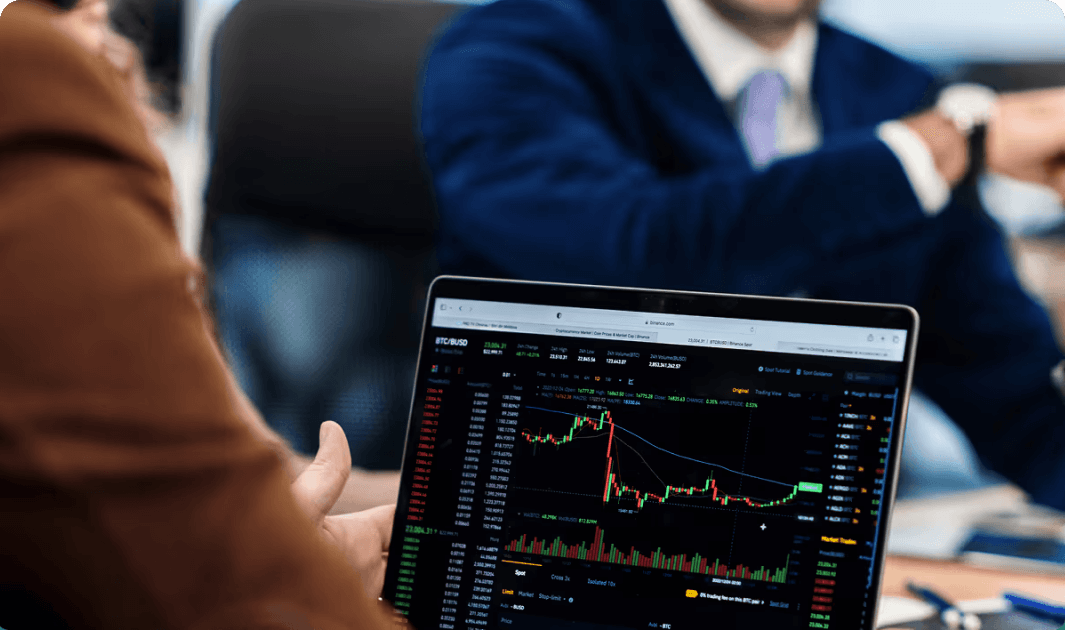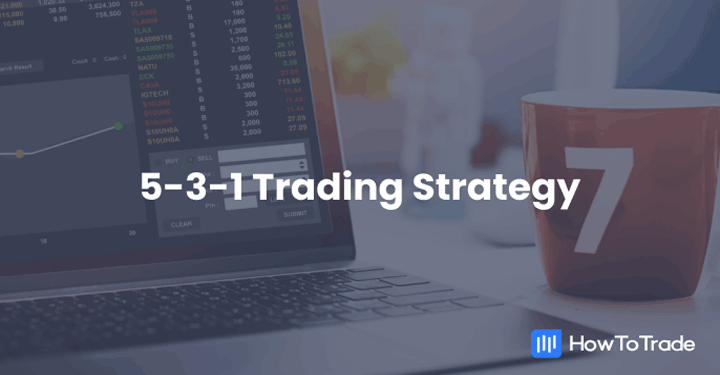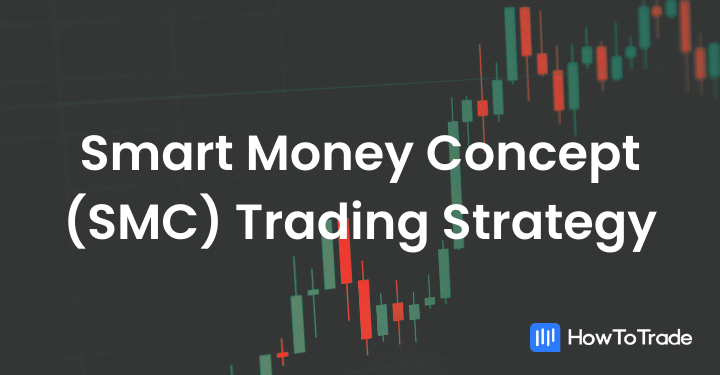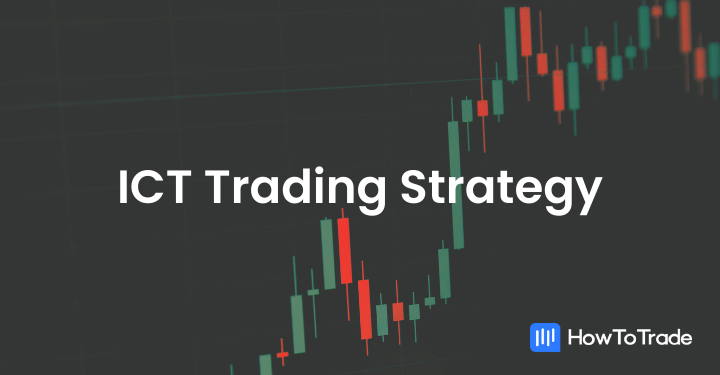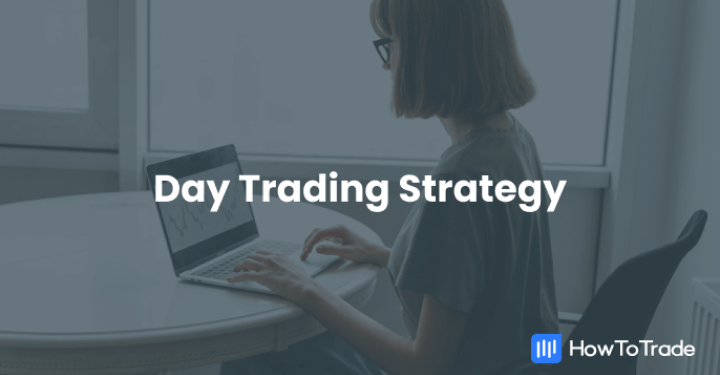
- Day trading is a short-term trading style where traders open and close a large number of trades on the same day, intending to profit from small price movements.
- Day trading is an excellent way of creating steady income; however, it requires great amount of time and effort.
- On average, it takes about three to twelve months to become a consistently profitable day trader.
Day trading is the dream job for many people, and rightfully so. If you can succeed as a day trader, you’ll be able to gain financial freedom and control your time. Moreover, it can give you the adrenaline rush and excitement many other professions simply cannot provide.
So, are you interested in learning how to day trade forex? If so, you’ve come to the right place!
 Table of Contents
Table of Contents
What is Day Trading?
Day trading is a popular short-term trading style where traders open and close a large number of trades on the same day, intending to profit from small price movements. Typically, day traders focus on several assets to trade on during the day, getting in and out of positions repeatedly and trying to take advantage of small price changes. Finally, they close all positions by the end of the day and finish the day with either a profit or a loss.
Unlike swing and position trading, day traders do not hold their trades overnight. As a result, they reduce risks associated with holding forex positions overnight.
Day trading forex is suited for forex traders with enough time throughout the day to analyze, execute, and monitor their trade. It could be a full-time or part-time job that might be extremely rewarding and, at the same time, challenging and demanding.
5 Types of Day Trading Strategies
Day traders looking to maximize intraday profits often use one or more of the following forex day trading strategies.
1. Trend Trading
Trend trading is a strategy that looks at longer time frame charts to determine an overall trend. It is usually considered a mid to long-term forex trading strategy, but in reality, it can cover any timeframe, depending on how long the trend lasts, and can, therefore, be used by day traders as well.
Generally, trend trading is based on the idea that markets have an element of predictability. So, by analyzing past performance and historical trends, a trader can predict what could happen in the future.
When the price moves in one overall direction, such as up or down, it is called a trend. Trend traders enter a long position when a currency pair is trending upward. An uptrend is characterized by higher swing highs. On the other hand, trend traders may opt to enter a short-selling position when an asset is trending lower. A downtrend is characterized by lower-swing lows and lower-swing highs. Here’s what trend trending looks like on a 5-Min GBP/USD price chart:
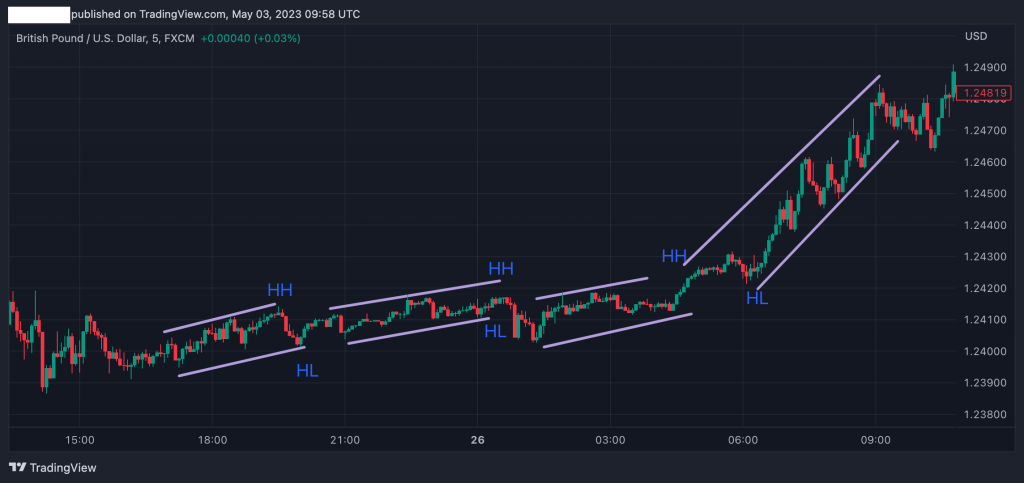
2. Countertrend Trading
Countertrend day trading is a strategy in which traders attempt to trade against the current trend. The idea here is to find the end of a trend and get in early when the trend reverses. For that matter, they often use various chart patterns to determine whether a reversal is likely to occur.
Countertrend trading refers to the opportunity to take advantage of a trend that reverses or swings in a new direction. It is generally a medium-term strategy in which positions are held between several days and weeks, although it can also be used as a day trading technique.
While this strategy is a little riskier, it can have considerable rewards in the long run.
Here’s an example of counter-trend trading:
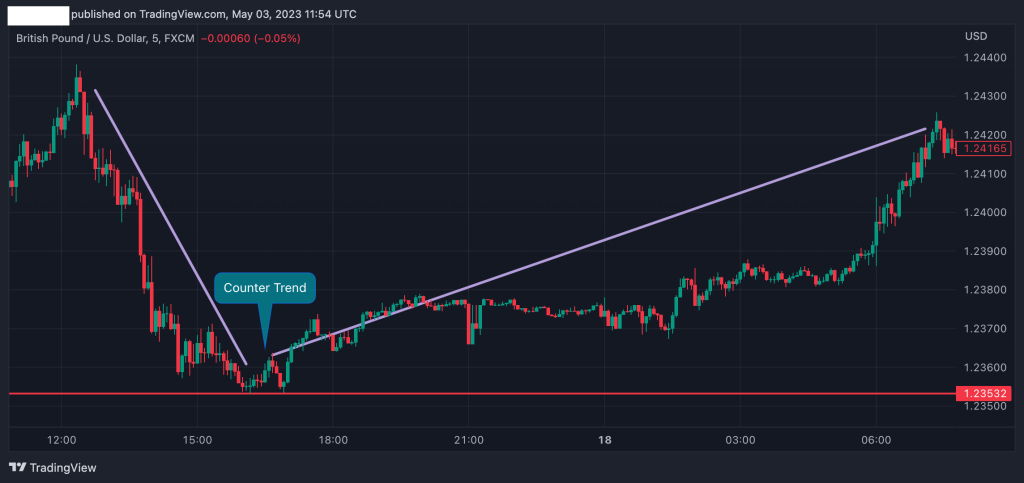
As you can see in the GBP/USD 5-Min chart above, as the downtrend reaches its support level, and the currency pair price forms a double bottom pattern – the price then reverses, and a new trend begins. That is what countertrend trading is all about – trying to make profits by trading against the current trend.
3. Range Trading
Range trading, sometimes called channel trading, is a day trading strategy that starts with understanding and analyzing the recent price action. In other words, a trader must identify an area where the price consolidates and trades inside a predefined range.
A trader will inspect chart patterns and support and resistance levels to identify typical highs and lows during the day while keeping an eye on the difference between these points.
For example, if the price has been rising off a support level or falling off a resistance level several times, then a trader might choose to buy or sell based on their perception of the market’s direction. This is known as trading in a range, where each time the price hits a high, it falls back to the low. And vice versa. A day trader using this strategy is looking to buy the currency pair around the low price (support level) and sell at the high price (resistance level).
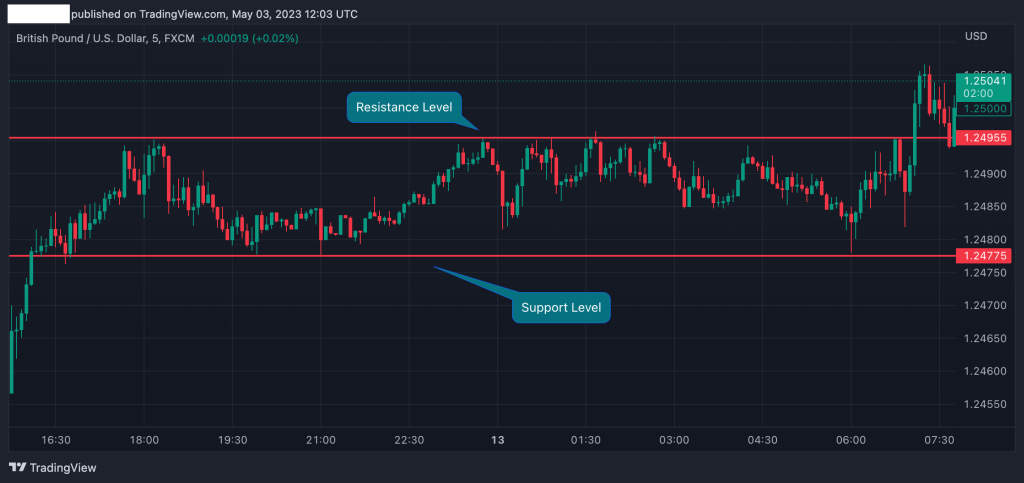
4. Breakout Trading
Breakout trading is when a trader looks at the range a pair has made during certain hours of the day or on a higher timeframe and then places trades on either side, hoping to catch a breakout in either direction.
While many approaches encourage trade execution in response to current price action, breakout trading promotes market entry by anticipating an upcoming move. This is especially effective when a pair has a tight range for a long period, as it generally indicates that the pair is about to make a move. The longer the range, the greater the breakout.
The goal is to be set up so that you are ready to catch the wave when the move takes place! It is an exciting trading method requiring you to pay attention and be ready to enter and exit at the right time and levels.

5. News Trading
News trading is one of the most traditional, short-term-focused trading strategies used by day traders. News traders pay less attention to charts and technical analysis; instead, they wait for information to be released that they believe will drive prices in the forex market in one direction.
This information could, for example, be a report releasing economic data on an economic calendar, such as unemployment, interest rates, non-farm payrolls, inflation, or simply breaking news and tweets.
To master news trading, day traders tend to have a good understanding of the forex markets in which they’re trading and know how to react to each economic event. As such, they must understand what affects the prices of currency pairs, how to read a forex economic calendar, and how to trade the news in the forex market.
Is Day Trading Worth It?
Frankly, day trading is challenging, and the chances to succeed are not that high. Statistically, eight or nine out of ten traders usually fail to become successful day traders.
The reason is that day trading is a very competitive field, and not everyone can deal with this type of working environment. Also, many people start day trading with a lack of knowledge about the economy, financial markets, and technical tools like trading platforms, margins, and leverage. Unrealistic expectations are another major obstacle for many newcomers.
You cannot become a consistently profitable trader in one day, week, or month. It takes time to learn the markets, the financial jargon, and the small tricks (like learning MT4 hotkeys) that make an average trader an excellent one. Finally, trading psychology is the biggest obstacle to overcome in the trading arena. Much like tennis, boxing, or any other individual sport – in trading, your biggest rival is yourself.
As such, to become a successful day trader, you need to put in months and even years of hard work to understand how financial markets work, develop a successful strategy, learn how to control your emotions, and execute your trading plan consistently. In trading, knowledge is a strength. Those who consistently learn and adapt to new developments will also take the lead. Therefore, you better read trading books, watch trading movies, take online forex trading courses, and regularly visit forex forums. Of course, it does not guarantee success, but it can certainly set you in the right direction. Furthermore, if you decide to become a professional day trader, you must build a home trading computer setup.
So clearly, you need to dedicate time and effort to succeed as a day trader. There are no shortcuts to success. The average time for a beginner trader to learn this career and all the other skills you need to succeed in day trading is between 6-12 months. Furthermore, if you decide to trade with your capital through retail brokers, you also risk losing your money. So, no, it’s not easy.
On the other side of the coin, when you think about it, the chances to succeed as a day trader are still high compared to other professions. I mean, the chances of becoming an astronaut, athlete, or even a doctor, for example, are not very high as well, right?
Only a few traders make money consistently from day trade activities. But when they do, it’s worth it. Day trading is an exciting profession that can be done anywhere and on your terms.
What’s more, trading is a scalable business, meaning there is no limit to how much money you can make. If you are a good trader, you will be able to increase trading volumes and trade with more capital. Ultimately, you might be able to get the financial freedom you are looking for, which is something that simply cannot happen in many other professions.
And, at last, unlike other professions, starting a day trading career has never been easier. Essentially, you can start your day trading venture as a retail or prop trader. Either way, starting your own day trading business is extremely simple nowadays.
“No one is born a great trader, one learns by trading. And no trader can be successful unless they have developed trading discipline.”
The Day Trading Strategy PDF
If you need something to easily carry around and refer to when it comes to day trading, this PDF is for you:
Becoming a Day Trader – Pros and Cons
If you still have doubts, let’s see if you have what are the pros and cons of becoming a forex day trader:
Pros
- No overnight risk, which reduces the stress and may assist in developing a consistently profitable trading method
- The possibility to work from any place in the world and on your own terms
- You are your own boss
- Day trading is an exciting job that will assist you in discovering your personality and characteristics
- It is a scalable business, which means you can grow your wealth exponentially in case you are a good trader
- Formal education is not necessary. You can educate yourself through online courses and educational material such as books, podcasts, and movies
- Nowadays, there’s no need to invest your capital in starting day trading. Instead, you can start a day trading career without any capital via an online prop trading firm like HowToTrade
Cons
- There’s no basic salary. You need to build your own income
- It’s a competitive and unfriendly environment
- It requires you to dedicate a lot of time and effort in order to succeed
- It is a stressful job
- Failure is a big part of being a successful day trader. Over time, it can be frustrating and lead to mental health problems
How to Start Day Trading
Day trading is an excellent way of creating steady income from trading the financial markets. So whether you are planning to become a full-time trader or just looking to day trade in your spare time for extra income, day forex trading is the answer.
And this is where we come in to help you. With our Trading Academy, you can quickly start your own day trading business without any investment and with support from our trading coaches.
Here’s what you get with HowToTrade:
 Here’s what you get with HowToTrade:
Here’s what you get with HowToTrade:
- Access to our Trading Academy, where you can discuss the forex day trading strategy with market analysts and other members of the community
- Easy-to-understand video lessons
- Free Forex and stock lessons
- Technical analysis and chart pattern guides
- Technical indicator guides
- News and updates are sent directly to your inbox
Frequently Asked Questions (FAQs)
Here are some of the most frequently asked questions when it comes to day trading strategies:
How long does it take to learn to day trade?
It’s hard to say precisely how long it will take for someone to become a proficient day trader. It’s subjective to every person. After all, Mozart composed his original compositions from the age of four or five, so you may be a born trader.
Still, on average, it takes about three to twelve months to become a consistently profitable day trader.
Is it easy to learn day trading?
No, day trading is certainly not easy to learn, nor is it easy to do. Learning how to day trade requires time, knowledge, analytical and fundamental skills, and most importantly, discipline. It may take months or even years to become familiar with all the terms, trading tools, and different market conditions. But, then again, it is no different than many other professions. Much like becoming a professional musician, a lawyer, or an accountant – if you want to become a day trader, you need to put in the effort to build successful trading strategies and develop a winning mindset.
How much money do I need to start day trading?
The initial amount of money you need to start day trading forex mostly depends on your goals. If you plan to do it as an additional income, then you can put $ 1,000 to $5,000 as your initial investment and use leverage to increase your purchasing power. However, that is a risky plan, and we must inform you that many traders who invest little to make big profits end up losing money rapidly with retail investor accounts.
So, how much money do you need to start day trading professionally? Well, professional day traders make a monthly return of around 3%-10% of their account size. This means that if you are planning to build a day trading career with a steady income, you must have at least $100k in your account.
Risk Disclosure: The information provided in this article is not intended to give financial advice, recommend investments, guarantee profits, or shield you from losses. Our content is only for informational purposes and to help you understand the risks and complexity of these markets by providing objective analysis. Before trading, carefully consider your experience, financial goals, and risk tolerance. Trading involves significant potential for financial loss and isn't suitable for everyone.

